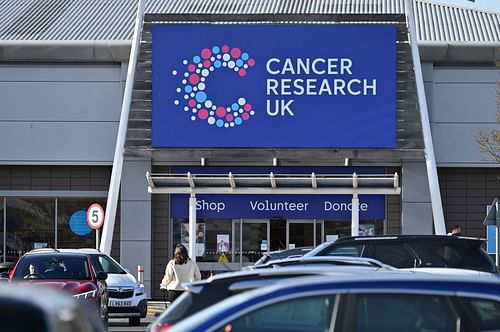
Stage 3 Non-Hodgkin's Lymphoma survival rate explored as Dave Coulier announces cancer diagnosis
Dave Coulier recently revealed that he has been diagnosed with Stage 3 non-Hodgkin lymphoma in an exclusive interview with TODAY, published on November 13, 2024. It is a type of blood cancer that starts in a person's lymphatic system.
The Fuller House alum revealed that he had started noticing the first signs of cancer a little over a month ago when he came down with a bad cold. Coulier noticed a golf ball-sized lump in his groin area within a week of catching the cold.
“It swelled up immediately. I thought, ‘Wow, I’m either really sick, or my body’s really reacting to something,” said Dave Coulier in the interview.
Doctors ran numerous tests like EKG, bloodwork, and many CT scans but everything came out normal. However, the biopsy of Dave Coulier's lymph node revealed the real reason for his sickness.
"[My doctors] said, ‘Hey, we wish we had better news, but you have non-Hodgkin lymphoma, B-cell lymphoma,’” Dave Coulier recalled. “It was a shock.”
According to a report by the American Cancer Society, Stage 3 non-Hodgkin lymphoma signifies that the cancer hasn't spread outside the lymphatic system. The report also asserts that a person with B-cell non-Hodgkin lymphoma has a 74% chance of surviving the next five years.
In the interview, Dave Coulier talked about the curable nature of his type of cancer. Since it hadn't spread to his bone marrow, doctors reassured him that the curablity rate was upwards of 90%.
Despite the grim nature of his diagnosis, the veteran actor talked about his positive mindset in the interview.
“My joke is that in four short weeks I’ve gone from a Virgo to a Cancer. I’ve tried to retain a sense of reality but also a sense of humor about it,” he quipped.
What is non-Hodgkin lymphoma? Diagnosis explored in relation to Dave Coulier's B-cell non-Hodgkin lymphoma

According to the Cleveland Clinic, non-Hodgkin lymphoma is an acquired genetic disorder that happens when certain genes inside the cells of the body mutate. Developed inside the lymphatic system, the affected cells in this case are generally the B lymphocytes or T lymphocytes of our immunity system.
Non-Hodgkin is one of the more common types of cancers with over 70 varieties of the disease known till now. According to the U.S. National Cancer Institute, three percent of all cancer-related deaths happen because of non-Hodgkin lymphoma and five in every 100,000 people are affected by the disease.
This type of cancer disrupts the body's ability to fight other diseases by affecting the immunity system. This is because it affects a type of white blood cells called lymphocytes, which are a major part of the body's immune system. These cells include B cells, T cells, and the natural killer (NK) cells.
Dave Coulier is reportedly affected with B-cell non-Hodgkin lymphoma. According to the Cleveland Clinic, there are three types of B-cell lymphoma - Diffuse Large B-cell lymphoma (DLBCL), Mantle cell lymphoma, Burkitt lymphoma, and Lymphoblastic lymphoma.
Diffuse Large B-cell lymphoma (DLBCL) accounts for over 30% of all non-Hodgkin lymphoma cases in the United States and is the most common type of lymphoma. This type of cancer may start in one of the lymph nodes and grow very quickly.
There are three different sub-categories of Diffuse Large B-cell lymphoma (DLBCL) - germinal center B-cell-like (GCB), activated B-cell-like (ABC), and unclassified. Chemotherapy and other medications are administered based on the type of DLBCL.
Mantle cell lymphoma generally affects men aged 60 or older when a cell in the mantle region of a lymph node mutates. It accounts for 5% to 7% of all non-Hodgkin lymphoma cases. It generally happens in older people who have lymphoma in organs like the spleen and their bloodstream.
Burkitt lymphoma is one of the fastest-growing cancers but has a high durability and remission rate. The type of cancer generally goes into remission after intense chemotherapy. Finally, Lymphoblastic lymphoma is very similar to acute lymphoblastic leukemia. It generally affects immature lymphoblasts, i.e., the cells responsible for producing healthy lymphocytes.
Dave Coulier talks about his family's struggles with cancer across generations

In the interview with TODAY, Dave Coulier revealed that his family has struggled with cancer for a long time. The stand-up comedian and actor revealed that his sister Sharon died at 36 because of breast cancer. He also lost his mother to cancer and his sister Karen has it as well.
“When I was diagnosed, all of those memories came back of what they went through and so many hospital visits and sitting bedside and talking and having conversations and watching them leave the planet. What they went through is 10 times harder than what I’m going through. So, if I can be one-tenth as strong as they were, I’m going to be fine,” reminisced Dave Coulier.
The 65-year-old ended the conversation with a word of caution for everyone. He insisted on people adopting precautionary measures like pre-screening, breast exams, mammograms, prostrate exams, or a colonoscopy. Coulier highlighted that it could go a long way towards extending the lifespan of an individual.